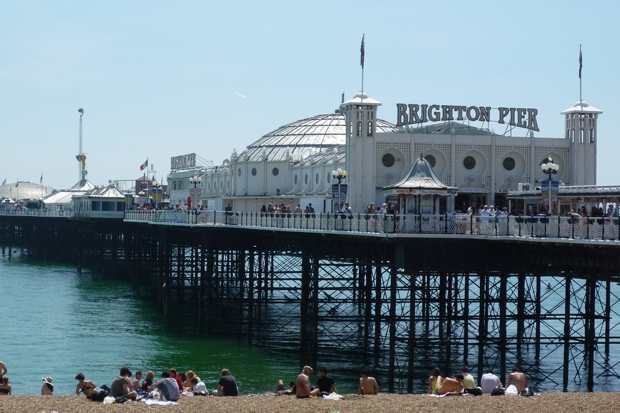Many people have described what it’s like to find themselves the target of an internet lynch mob. Perhaps more unusually, the other week I woke up to find myself at the head of one.
It wasn’t my intention to bring the wrath of a whole city down upon Julian Caddy, the managing director of arts festival Brighton Fringe; I merely wanted to vent my own anger. In truth, he brought it on himself by authoring an odious and spectacularly ill-judged piece in the local paper, the Argus. Ostensibly, he was writing about Brighton & Hove’s Palace Pier. But his real subject was the people of Brighton.The pier, he wrote, represented all that was ‘cheap’ and ‘tacky’ about Brighton, luring ‘people willing to spend their two pence on [arcade] machines, via Sports Direct and Primark on their way back to their coaches’. He contrasted this to the part of the town which is ‘vibrant’, ‘creative’, ‘modern’, ‘dynamic’ – and could extend itself by turning the pier and seafront into places more congenial to his own tastes. The subtext was so clear it was barely sub. Let’s have fewer of these contemptible plebs here, please, and more people like me.
The red mist descended. I wrote a public, obscenity-laden response on my Facebook wall. Unlike Caddy – I said – who lives in London and has worked in Brighton for five years, I have been a Brighton resident for most of my adult life, and loved the place throughout, in all its variety. Brighton has always possessed a certain tawdry elegance, a combination of sleaze and high cheekbones, fur coat and no knickers. I railed against Caddy’s vapid snobbery and his vision of a town fit only for himself and his self-regarding ilk.As a longtime ‘creative’ media professional, I added, I would want to take a flamethrower to the place were it populated and visited exclusively by the kind of people whom it would cause Julian Caddy no discomfort to be seated beside at a dinner party. What a dreary prospect narcissistically mistaking itself for arty vigour.
I want Brighton to remain full of life. That means not only the arts festivals I enjoy so much – including Brighton Fringe – but also day-tripping families; happy, pissed-up people larking about; roving, roaring gangs of hens and stags. I see no reason why these things and many others may not continue to co-exist as they have done for so long. Although, if I had to choose, I would take the people. Caddy, on the other hand, seems to want to render the town indistinguishable from every other sanitised locale in the country.This rant swiftly went viral, and attracted a host of comments more or less equally supportive of the sentiments. It touched a nerve not only in Brighton but in Soho, Hoxton, Bristol, Worthing – anywhere people feel the dead hand of gentrification upon them. They see the places they love becoming unaffordable, homogenous and sterile, and they seethe at it.
Julian Caddy’s mistake was to cheerlead for this process, while failing to disguise his disdain for its casualties. I haven’t joined in the calls for his sacking; I don’t like the internet’s ‘off with his head’ attitude to anything it objects to, and for all I know he’s good at his job. That’s none of my business. But Brighton is my home, a place built upon the acceptance of everybody else so long as they in turn accept everybody else. The barbarians at its gates don’t pitch up in coaches. They travel on commuter trains, and their flag bears the dreaded slogan: ‘Vibrant – Dynamic – Modern – Creative’.






Comments